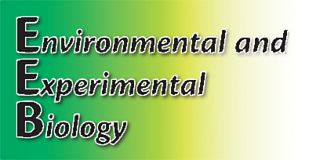
On-line: ISSN 2255–9582

| Faculty of Biology, University of Latvia | ||||||

|
Hard copy: ISSN 1691–8088
On-line: ISSN 2255–9582 Environ Exp Biol (2017) 15: 15–24
|
|||||

|
About the Journal | Retractions | Open Access | Author Guidlines | Current Issue | Archive |
|
Environmental and Experimental Biology |
Environ Exp Biol (2017) 15: 15–24 |
A pot culture experiment was carried out under greenhouse conditions to study the effect of potassium fertilizer (70 mg kg–1, K1, and 100 mg kg–1, K2) and arbuscular mycorrhizal fungi (Glomus mosseae and Acaulospora laevis) alone and in different combinations on water stress amelioration of Vigna mungo during three growth stages. Treatment of the plants with mycorrhizal fungi and potassium improved physiological parameters including chlorophyll concentration, membrane stability, phosphatase activity, leaf protein concentration and mycorrhization over the untreated control regardless of water stress treatments. Imposition of water stress at reproductive stage caused maximum reduction in membrane stability, leaf protein concentration, phosphatase activity and mycorrhization as compared to stress during other stages. Treatment combinations of G. mosseae + A. laevis + K2 and G. mosseae + A. laevis + K1 proved to be the best for promoting physiological and morphological parameters studied both in stressed and unstressed plants. A combination of G. mosseae and K2 was the best among double inoculation treatments while G. mosseae was the best among single treatments of either dose of potassium and A. laevis for stress alleviation and growth amelioration. Imposition of water stress during vegetative stage had the least effect on the physiological parameters studied, except for leaf area, which was adversely affected. Chlorophyll concentration was the most affected parameter by water stress at the pod formation stage.